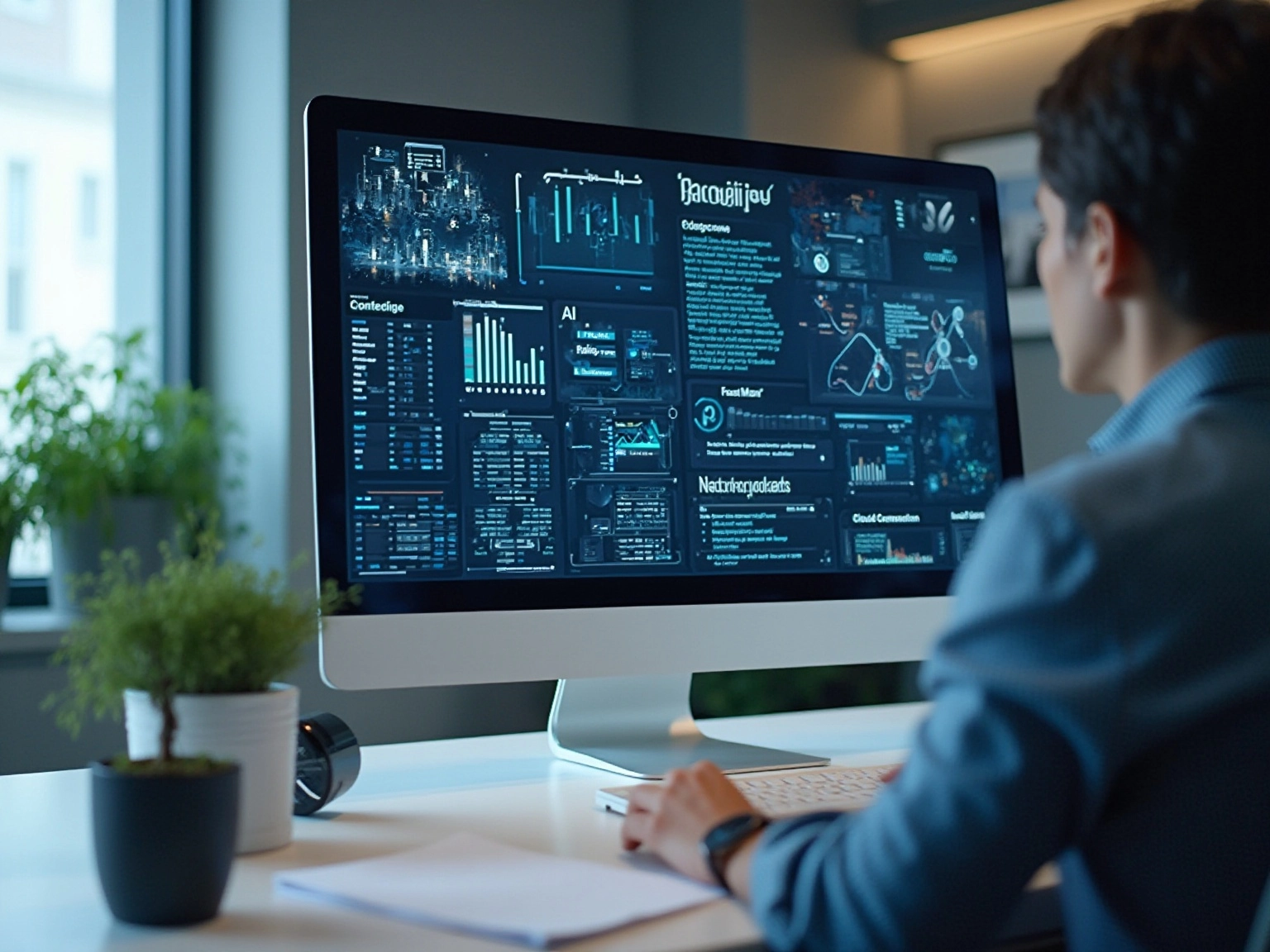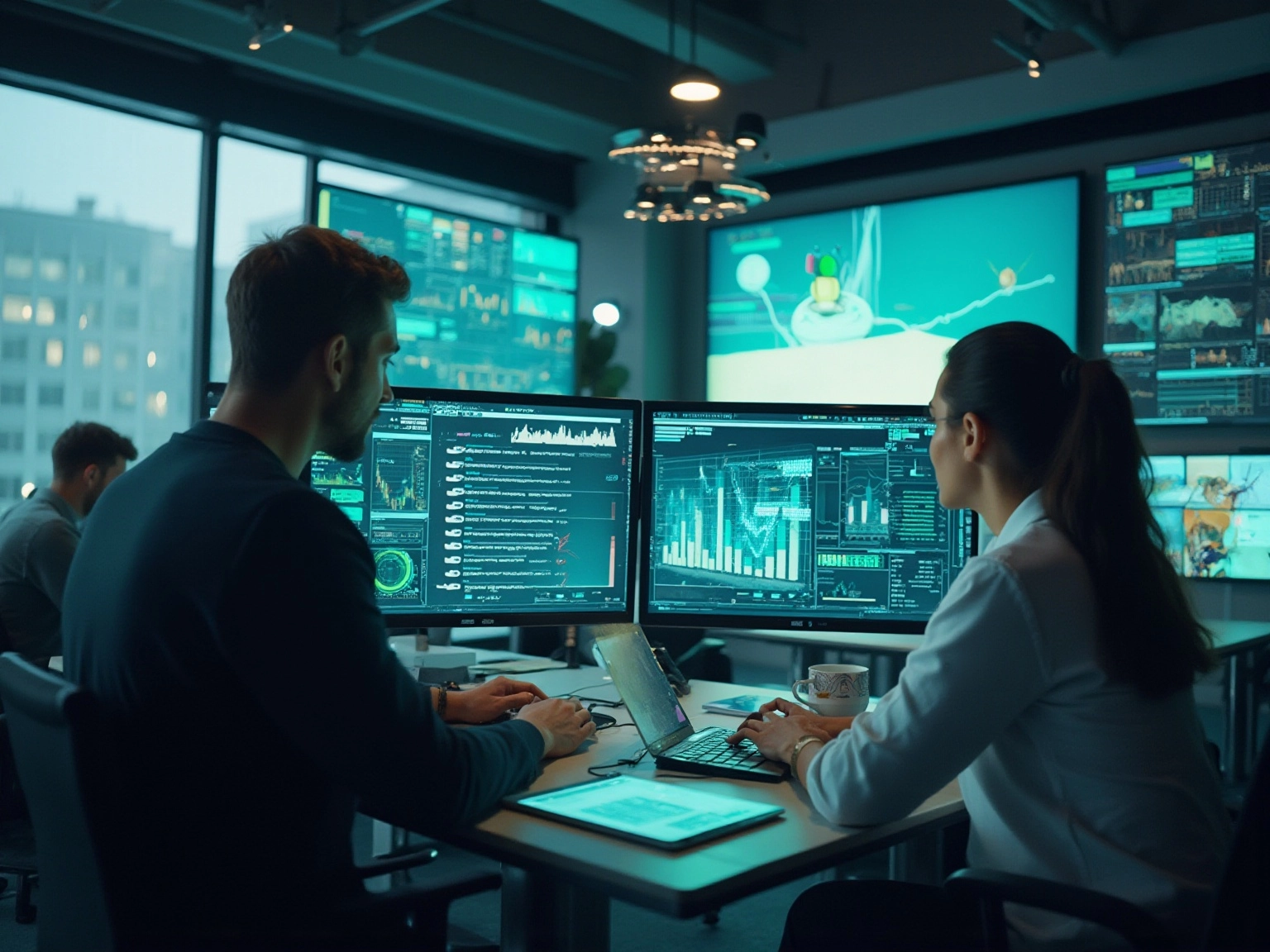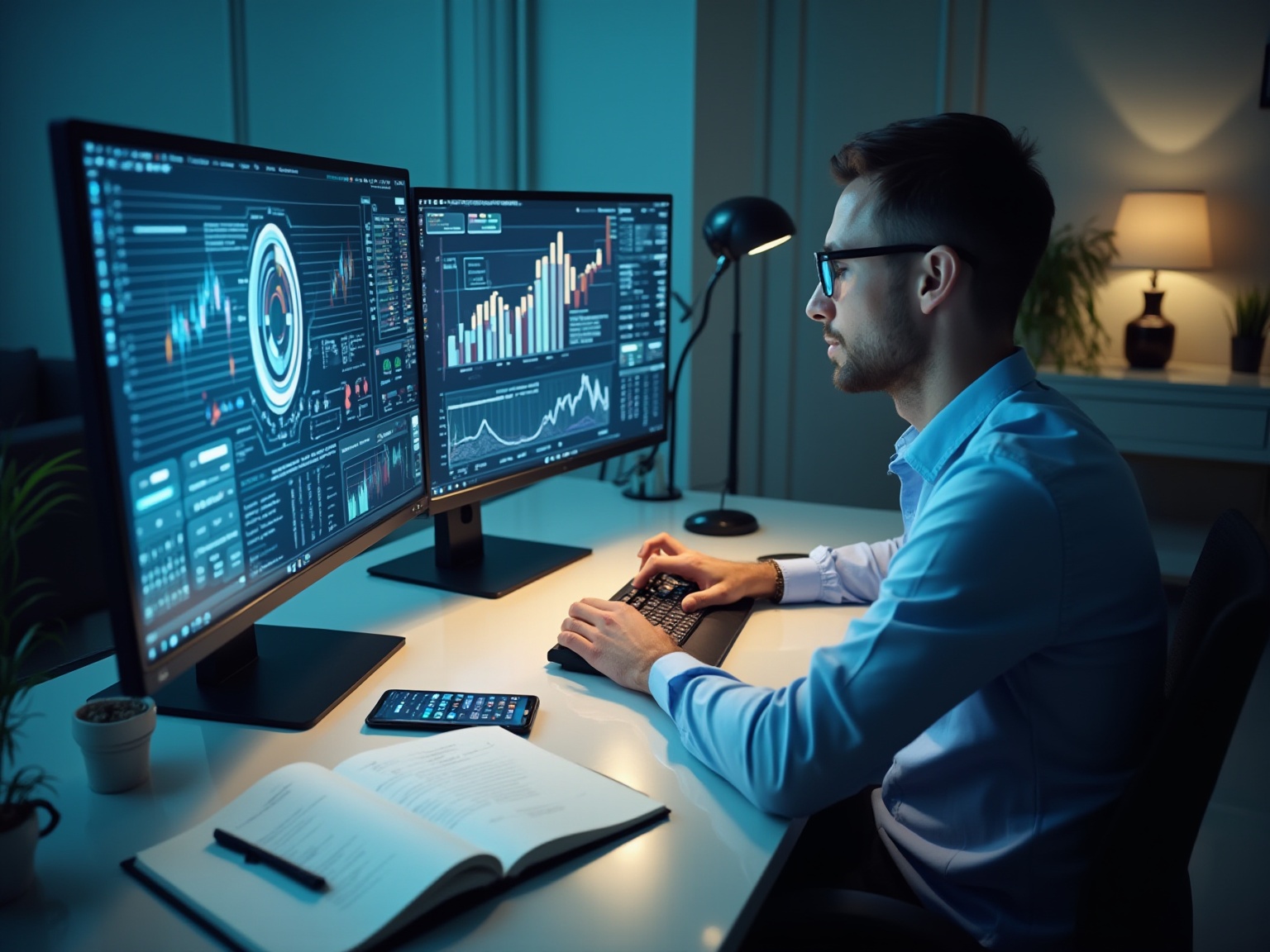Overview
This article examines the transformative impact of technology on the accounting profession, illustrating how it enhances efficiency, accuracy, and decision-making through innovative tools such as cloud computing, AI, and data analytics. The evidence presented underscores significant improvements in operational performance; for instance, firms that integrate platforms like Glasscubes experience a remarkable 40% increase in customer response rates and a 50% reduction in response times. These statistics exemplify the tangible benefits of adopting technology within accounting practices, making a compelling case for its integration. As the accounting landscape continues to evolve, embracing these advancements is not just beneficial but essential for staying competitive.
Key Highlights:
- Technology is revolutionising accounting practices, enhancing efficiency, accuracy, and decision-making.
- 86% of companies have implemented cloud-based accounting systems, improving operational efficiency.
- Platforms like Glasscubes have led to a 40% increase in customer response rates and a 50% reduction in response times.
- Key technologies influencing accounting include cloud computing, AI, blockchain, and data analytics.
- Automation of routine tasks allows accountants to focus on higher-value activities, increasing productivity.
- Digital tools minimise human error, with companies seeing up to a 30% reduction in error rates.
- Challenges in adopting technology include resistance to change, compliance issues, training needs, and data security concerns.
- Future trends include increased use of AI, greater emphasis on cybersecurity, expansion of remote work solutions, and integration of advanced analytics.
- Continuous learning and fostering a culture of innovation are essential for accountants to thrive in the evolving landscape.
Introduction
In the rapidly evolving landscape of accounting, the integration of technology stands as a transformative force reshaping the profession.
As firms increasingly adopt advanced tools such as cloud computing, artificial intelligence, and data analytics, accountants are experiencing a significant shift in their operational methods.
This technological revolution not only promises enhanced efficiency and improved accuracy but also elevates client engagement.
However, it introduces a set of challenges that professionals must adeptly navigate.
- Overcoming resistance to change
- Ensuring compliance
- Maintaining security
These are critical hurdles in the journey toward modernisation.
This endeavour requires strategic planning and a steadfast commitment to continuous learning.
Looking ahead, the ability to adapt to these innovations will be essential for accountants striving to thrive in an increasingly competitive environment.
Defining Accounting in the Technological Era
The integration of advanced innovations into traditional financial practices is revolutionising accounting in tech, fundamentally transforming the role of accountants. This evolution encompasses the adoption of software, automation, and data analytics in accounting, collectively enhancing efficiency, accuracy, and decision-making capabilities. As we progress through 2025, the impact of digital solutions on accounting methods is increasingly apparent, with 86% of companies reporting the implementation of cloud-based accounting systems.
This shift not only improves operational efficiency but also elevates customer satisfaction, particularly through platforms like Glasscubes, which streamline workflows and enhance interactions.
Accountants are now more than ever required to adopt new tools and methodologies, especially in the realm of accounting in tech, transitioning from manual processes to automated systems. For example, organisations utilising platforms like Glasscubes have reported a remarkable 40% increase in customer response rates and a 50% reduction in response times, showcasing the tangible benefits of technology integration. Glasscubes’ automated communication and information-gathering tools, including automated reminders and real-time visibility of requests, significantly enhance customer engagement and streamline the audit process.
Moreover, Glasscubes is secure, encrypted, and GDPR compliant, providing reassurance for both companies and customers. User testimonials highlight significant time savings during peak seasons, reinforcing the advantages of adopting such technologies in accounting. Additionally, the current landscape reflects a positive outlook among accounting professionals, with 82% anticipating business growth in the coming year, as noted by Jamerlyn Brown. This optimism is fuelled by the capacity of innovations to enhance customer interaction and simplify information collection, as demonstrated by the thorough and structured response system that Glasscubes offers.
Numerous accountants are adapting to these digital changes, with many businesses leveraging Glasscubes to efficiently track customer inquiries. Such innovations not only alleviate the burden of follow-ups but also foster a more organised and efficient process. The platform ensures that responses cannot get lost in busy inboxes, promoting confidence in interactions and reducing the time spent chasing late or missing items.
Without Glasscubes, companies often encounter chaotic communication, leading to inefficiencies and potential customer dissatisfaction.
However, the effective integration of these systems requires careful planning, investment, and change management. Addressing these challenges is crucial for companies to fully realise the advantages of ERP and automation.
In summary, the ongoing advancement of innovation in accounting in tech is reshaping roles and responsibilities, enhancing efficiency, and enabling firms to deliver improved client service. As the profession continues to evolve, the incorporation of digital tools, particularly through solutions like Glasscubes, will remain a vital factor in achieving success and maintaining competitiveness in the industry.

Key Technologies Revolutionising Accounting Practices
Several key technologies are revolutionising accounting in tech today, significantly enhancing efficiency and strategic value.
- Cloud Computing: This technology enables real-time access to financial data from any location, facilitating seamless collaboration and supporting remote work. With over 40% of companies reporting benefits from cloud deployment, and Gartner predicting that 85% of organisations will adopt a cloud-first principle by 2025, the shift towards cloud solutions is transforming the financial landscape. Additionally, many organisations are adopting hybrid or multi-cloud strategies to leverage multiple services and enhance security, reflecting a strategic approach to cloud management.
- Artificial Intelligence (AI): AI is at the forefront of automating repetitive tasks such as data entry and invoice processing. This automation enables accountants to redirect their focus towards higher-value activities, ultimately enhancing productivity and service. Current trends indicate a growing reliance on AI tools, which are becoming integral to accounting in tech practices. For example, companies that have embraced innovative solutions like Glasscubes have reported a 50% decrease in customer response times and a 40% increase in customer interaction, demonstrating the efficiency improvements achievable through AI integration and streamlined communication.
- Blockchain: By enhancing transparency and security in financial transactions, blockchain systems significantly reduce the risk of fraud. Its immutable ledger system provides a reliable framework for tracking transactions, which is increasingly vital in today’s digital economy.
- Data Analytics: Advanced data analytics tools offer deep insights into financial performance and emerging trends, empowering accountants to make more informed decisions. This capability not only assists in strategic planning but also improves the overall value provided to customers. As emphasised by Sophie Montgomery of TaxAssist Accountants, the implementation of such innovations can result in significant time savings, with accounts of 288 hours saved in merely one tax season.
These innovations collectively enhance operational efficiency and enable accounting in tech to deliver more strategic value to their customers, positioning firms to prosper in a progressively competitive landscape. With tools like Glasscubes, accountants can streamline information gathering, utilise automated workflows, and maintain secure, organised communication that overcomes the limitations of traditional email, such as misplaced responses and lack of visibility. Glasscubes ensures that all correspondence is contained within each audit request, is secure, encrypted, and GDPR compliant, ultimately enhancing customer engagement and satisfaction.

Benefits of Technology in Accounting: Efficiency and Accuracy
The integration of digital tools in accounting offers a myriad of advantages that are transforming the profession:
- Increased Efficiency: The automation of routine tasks significantly reduces the time accountants dedicate to manual processes. This empowers firms to effectively manage a larger customer base, with studies indicating that organisations adopting automation can achieve efficiency gains of up to 40%. For instance, Sophie Montgomery from TaxAssist Accountants reported an impressive 288 hours saved in just one tax season through the utilisation of innovative tools.
- Enhanced Accuracy: Leveraging technology minimises human error in data entry and calculations, leading to more reliable financial reporting. Companies employing advanced financial software have observed a notable enhancement in precision, with error rates declining by up to 30%.
- Enhanced Customer Engagement: Innovative tools, such as portals like Glasscubes, facilitate seamless communication and information exchange. As highlighted by audit manager Steve from MGI, the transition to Glasscubes has resulted in quicker responses from customers and improved transparency, allowing both customers and the audit team to monitor outstanding information in real-time. This not only elevates the overall user experience but also leads to a 50% reduction in response times, as evidenced by organisations utilising platforms like Glasscubes.
- Cost Savings: Streamlining operations through innovation enables organisations to lower overhead expenses associated with traditional practices. For instance, robotic process automation (RPA) software robots can function at one-third the cost of an offshore full-time employee, providing substantial financial relief. This cost-effectiveness is crucial as companies navigate the complexities of contemporary financial management.
These technological advancements in accounting not only enhance profitability for financial organisations but also cultivate stronger relationships with clients, positioning them for sustained success in an increasingly competitive landscape. As the industry continues to evolve, embracing these innovations will be essential for accountants seeking to improve their service delivery and operational efficiency. Furthermore, while 34% of UK respondents perceive more risks than advantages in automation, it is vital for companies to recognise the potential benefits and strategically implement these innovations.
Challenges in Adopting Technology in Accounting
The incorporation of advancements in accounting presents several significant challenges that must be addressed to harness their full potential:
- Resistance to Change: A notable barrier is the reluctance among accountants to shift from traditional practices to modern tools. This resistance often stems from concerns about disrupting established workflows and the fear of the unknown, which can hinder progress. Statistics indicate that over 60% of accountants express concerns about the implications of new advancements on their workflows, underscoring the need for strategic approaches to overcome these barriers.
- Compliance Issues: Navigating the regulatory landscape is another critical challenge. Innovative solutions must align with stringent compliance standards, which can be intricate and require meticulous planning. For instance, companies adopting automated solutions must ensure that these tools meet the necessary legal and ethical guidelines—a daunting task without proper oversight. Environmental factors, such as competition and regulatory requirements, significantly influence technology adoption decisions.
- Training Needs: The successful implementation of new technologies often necessitates comprehensive training for accounting professionals. This requirement can be both time-consuming and costly, as companies must invest in resources to ensure their teams are proficient in using the latest tools effectively. However, with Glasscubes, the onboarding experience is effortless—there’s no training required, and our team handles the initial setup during a personalised onboarding call. This approach allows teams to navigate the client portal expertly after just a brief introduction, significantly reducing the training burden. Moreover, simplifying the onboarding process helps mitigate resistance to change, as teams feel more confident in adopting new technologies that enhance accounting in tech.
- Data Security Concerns: As reliance on digital solutions in accounting increases, so do the risks associated with data security. Financial firms must prioritise cybersecurity measures to protect sensitive financial data from potential breaches, adding another layer of complexity to adopting new systems.
The market for automated bill-paying software is predicted to expand by 12.8% annually until 2030, indicating a growing trend in system adoption within the financial sector. Moreover, AI innovations that carry out activities demanding human intellect have potential applications in finance, such as data examination, forecasting, and fraud identification, although extensive application remains limited. FinOptimal’s Accruer software exemplifies strong automation features aimed at optimising financial processes, demonstrating how automation can ease the shift to new innovations.
Finally, the case study on blockchain’s effect on financial management highlights the transformative potential of innovation in the field, alongside the educational challenges associated with its adoption. Addressing these challenges is vital for companies seeking to incorporate innovation successfully.
Future Trends: What Lies Ahead for Accounting Technology
Looking forward, several key trends are poised to significantly influence the future of financial systems:
- Increased Use of AI and Machine Learning: The evolution of AI and machine learning is set to empower accountants with superior data analysis capabilities and predictive modelling. Financial forecasting models that leverage machine learning can analyse historical data, yielding more precise predictions based on market trends. These advancements facilitate more informed decision-making through real-time data, further enhanced by Glasscubes’ automated communication tools that streamline information sharing.
- Greater Emphasis on Cybersecurity: In light of escalating cyber threats, accounting organisations must prioritise robust security measures to safeguard customer data. Investing in cybersecurity solutions is essential; companies that overlook the protection of sensitive information risk damaging their reputation and eroding customer trust. This necessity aligns with the increasing demand for firms to adopt comprehensive security strategies to uphold customer confidence, a focus that Glasscubes bolsters through secure user portals.
- Expansion of Remote Work Solutions: The transition towards flexible work arrangements will catalyse the development of innovative tools designed to enhance remote collaboration and communication. As accountants operate from diverse locations, technology supporting seamless interaction will become indispensable in the accounting tech landscape. Glasscubes’ platform facilitates this by offering real-time reporting and collaboration features that enhance remote teamwork.
- Integration of Advanced Analytics: Firms will increasingly leverage data analytics to extract insights into financial performance and customer behaviour. This integration will refine decision-making processes, enabling accounting in tech to deliver more strategic advice and elevate customer engagement. For example, users like Sophie Montgomery from TaxAssist Accountants reported saving 288 hours in a single tax season by utilising innovative tools, underscoring the tangible impact of technology on efficiency. Glasscubes’ analytics capabilities further support this by providing insights that drive client engagement.
By remaining attuned to these trends, accountants can strategically position themselves to adapt and excel in a dynamic landscape, ensuring they stay competitive and responsive to client needs. As Phil Hobden notes, addressing the challenges anticipated in the finance sector by 2025 will be crucial for future success. Moreover, companies that have embraced solutions like Glasscubes have experienced a 50% reduction in response times, highlighting the efficiency of innovative solutions within the financial sector.

Embracing Change: The Path Forward for Accountants
To thrive in the evolving accounting landscape, accountants must embrace change through several key strategies:
- Investing in Continuous Learning: Staying abreast of the latest technologies and industry trends is crucial for maintaining a competitive edge. Continuous learning not only enhances individual skills but also contributes to overall firm performance. In fact, only 11.62% of organisations express dissatisfaction with their financial-accounting professionals, indicating a strong demand for knowledgeable accountants. This dissatisfaction can be mitigated through ongoing professional development, which is essential for adapting to new standards and practices.
- Fostering a Culture of Innovation: Encouraging team members to explore new tools and methodologies can lead to improved practices and enhanced customer services. Companies that emphasise innovation frequently experience substantial advantages, such as improved efficiency and customer satisfaction. For instance, users of Glasscubes, a platform designed to streamline client engagement, reported saving an impressive 288 hours in one tax season, alongside a 40% increase in client response rates. The platform’s dedicated onboarding assistance further supports firms in creating an organised and efficient process, fostering a culture of innovation.
- Collaborating with System Partners: Building relationships with system providers facilitates smoother transitions to new systems and access to cutting-edge solutions. This collaboration is essential for integrating innovative tools that can transform accounting practices.
- Prioritising Customer Engagement: Leveraging technology to enhance customer interactions strengthens relationships and improves overall satisfaction. By utilising platforms like Glasscubes that automate communication and streamline information gathering, accountants can significantly reduce response times and enhance customer engagement. Discover how Glasscubes transforms user engagements in just 4 minutes! Watch our on-demand demo to see how we streamline information gathering, allowing you to get faster, higher-quality responses from customers while avoiding workload bottlenecks and delays. Join companies like Menzies that have experienced a 40% enhancement in response times.
As Alina Ciuhureanu emphasises, “Continuous learning and professional development activities are important for auditors to integrate new knowledge into their current audit practices and stay updated with the latest auditing standards and methods.” By proactively embracing these changes, accountants can enhance their practices and better serve their clients by incorporating accounting in tech in a technology-driven world. Continuous learning and innovation are not just beneficial; they are essential for success in accounting in tech as we move further into 2025.
Conclusion
The integration of technology into accounting practices is not merely a trend; it is a vital transformation that reshapes the profession and enhances its capabilities. Key technologies such as cloud computing, artificial intelligence, and data analytics are driving significant improvements in efficiency, accuracy, and client engagement. As firms increasingly adopt these tools, they witness tangible benefits, including increased operational efficiency and reduced response times, ultimately leading to greater client satisfaction.
However, the journey toward modernisation is not without its challenges. Accountants must navigate resistance to change, compliance issues, and the need for comprehensive training. Addressing these hurdles is crucial for fully leveraging the potential of advanced technologies. As the accounting landscape continues to evolve, a commitment to continuous learning and fostering a culture of innovation will be essential.
Looking ahead, the future of accounting will be defined by the ability to adapt to emerging trends, such as enhanced cybersecurity measures and advanced analytics. Firms that prioritise these strategies and embrace technological advancements will not only maintain competitiveness but will also elevate their service delivery and strengthen client relationships. By actively engaging with the tools and innovations available, accountants position themselves for success in an increasingly dynamic environment, ensuring they meet the evolving needs of their clients and the industry as a whole.
